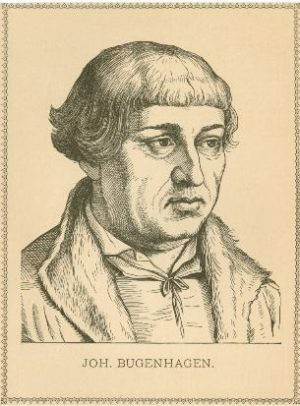Celebrating the 500th Anniversary of the Reformation
Faces of the Reformation – Pastor Johannes Bugenhagen

Who Is Johannes Bugenhagen?
Our final Face of the Reformation is Johannes Bugenhagen, who is famous for two reasons: he was Martin Luther’s pastor and confessor in Wittenberg, and he helped to spread the Reformation truths throughout Northern Germany and Scandinavia.
Bugenhagen was born in 1485 in the city of Wolin in the district of Pomerania. He studied at the University of Greifswald and eventually was ordained as a priest for St. Mary’s Church in Treptow. In 1520
Johannes first encountered the writings of Martin Luther and at first, he did not agree with what Luther was saying. Finally, though, he became a supporter of the Reformation and moved to Wittenberg. In 1523, he became the parish pastor of St. Mary’s Church in Wittenberg. He also became a member of Luther’s team which was charged with translating the Bible from Greek and Hebrew to German. Quickly, he became known as one of the most important teachers of biblical interpretation for the Protestant Reformation.
Church Work
In 1533, Johannes was made a doctor of theology at the University of Wittenberg. Later, he became known as the “second Apostle of the North.” He created new church orders, establishing them and convincing people to follow them. His rules and regulations described the order for religious service, schooling and social issues of the church. In 1539, he became the superintendent of the Lutheran Church in Saxony.
Rev. Bugenhagen married Martin and Katharina Luther in 1525 and in 1546, he conducted Luther’s funeral service. After Luther’s death, he took care of Katharina and the children.
Johannes Bugenhagen married Walpurga Bugenhagen in 1522 and they had three children: Johannes the Younger, who also became a professor for theology at the University of Wittenberg, and daughters Martha and Sara.
Contribution to the Reformation
Rev. Bugenhagen was a valued member of the Reformation for having established rules of order for the new Reformation congregations. For example, he was the one who wrote how the Lord’s Supper should be distributed in congregations. A quote from Rev. Bugenhagen states this: “After confession is made, also little children of about eight years of age or less should be admitted to the table of Him who says, ‘Suffer the little children to come unto Me.’” He used a principal of “adiaphora,” those things neither commanded or forbidden in Scripture, to allow for cultural differences in church practices. He translated Luther’s Bible into “Low German” so more people could read and understand God’s Word.
Johannes saw the importance of the church in society and provided guidance for pastors and churches to serve the community through care for the sick, education and interaction with the governing authorities. He preached the importance of maintaining the integrity of Lutheran theology, while still making it relevant and understandable to all of the members of the church.
Johannes Bugenhagen died in Wittenberg in 1558. He is buried at St. Mary’s Church. A motto attributed to Johannes Bugenhagen is: “If Christ you know, it is sufficient, though the rest you know not. If Christ you know not, it is nothing, though the rest you know.”